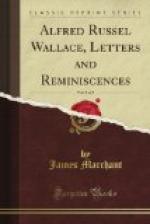to work. He felt no constraining impulse, his
attention was relaxed or engaged upon a novel, or
his seeds, or the plan of a new house, which always
excited his interest. Then, apparently suddenly,
whilst in one of his day-dreams, or in a fever (as
at Ternate, to recall the historical episode when
the theory of Natural Selection struck him), an explanation,
a theory, a discovery,[68] the plan of a new book,
came to him like a flash of light, and with the plan
the material, the arguments, the illustrations; the
words came tumbling one over the other in his brain,
and as suddenly his idleness vanished, and work, eager,
prolonged, unwearying, filled his days and months and
years until the message was written down and the task
fully accomplished. Whilst writing he referred
to few books, but wrote straight on, adding paragraph
to paragraph, chapter to chapter, without recasting
or revision.[69] And the result was fresh, striking,
original. It was a creation. The work being
done, he relapsed into his busy idleness. The
truth, as he saw it, seemed to come to him. Some
people called him a prophet, but he was not conscious
of that high calling. I do not remember him saying
that he was only a messenger. Perhaps later, when
he was reviewing his life, he connected his sudden
inspirations with a higher source, but for their realisation
he relied upon a foundation of veritable facts, facts
patiently accumulated, a foundation laid broad and
deep. He had the vision of the prophet allied
with the wisdom of the philosopher and the calm mental
detachment of the man of science. Perhaps another
explanation of his genius may be found in his open-mindedness.
Truth found ready access to his conscience, and always
a warm welcome, and he saw with open eyes where others
were stone-blind.
He belonged to our common humanity. No caste
or acquired pride or unapproachable intellectualism
cut him off from the people. His simple humanness
made him one with us all. And his humanity was
singularly comprehensive. It led him, for instance,
to investigate the subject of suffering in animals.
He noticed that all good men and women rightly shrank
from giving pain to them, and he set himself to prove
that the capacity for pain decreased as we descended
the scale of life, and that poets and others were
mistaken when they imputed acute suffering to the
lower creation, because of the very restricted response
of their nervous system. Even in the case of
the human infant, he concluded that only very slight
sensations are at first required, and that such only
are therefore developed. The sensation of pain
does not, probably, reach its maximum till the whole
organism is fully developed in the adult individual.
“This,” he added, with that characteristic
touch which made him kin to all oppressed people,
“is rather comforting in view of the sufferings
of so many infants needlessly sacrificed through the
terrible defects of our vicious social system.”
To Wallace pain was the birth-cry of a soul’s
advance—the stamp of rank in nature is
capacity for pain. Pain, he held, was always strictly
subordinated to the law of utility, and was never developed
beyond what was actually needed for the protection
and advance of life. This brings the sensitive
soul immense relief. Our susceptibility to the
higher agonies is a condition of our advance in life’s
pageant.




